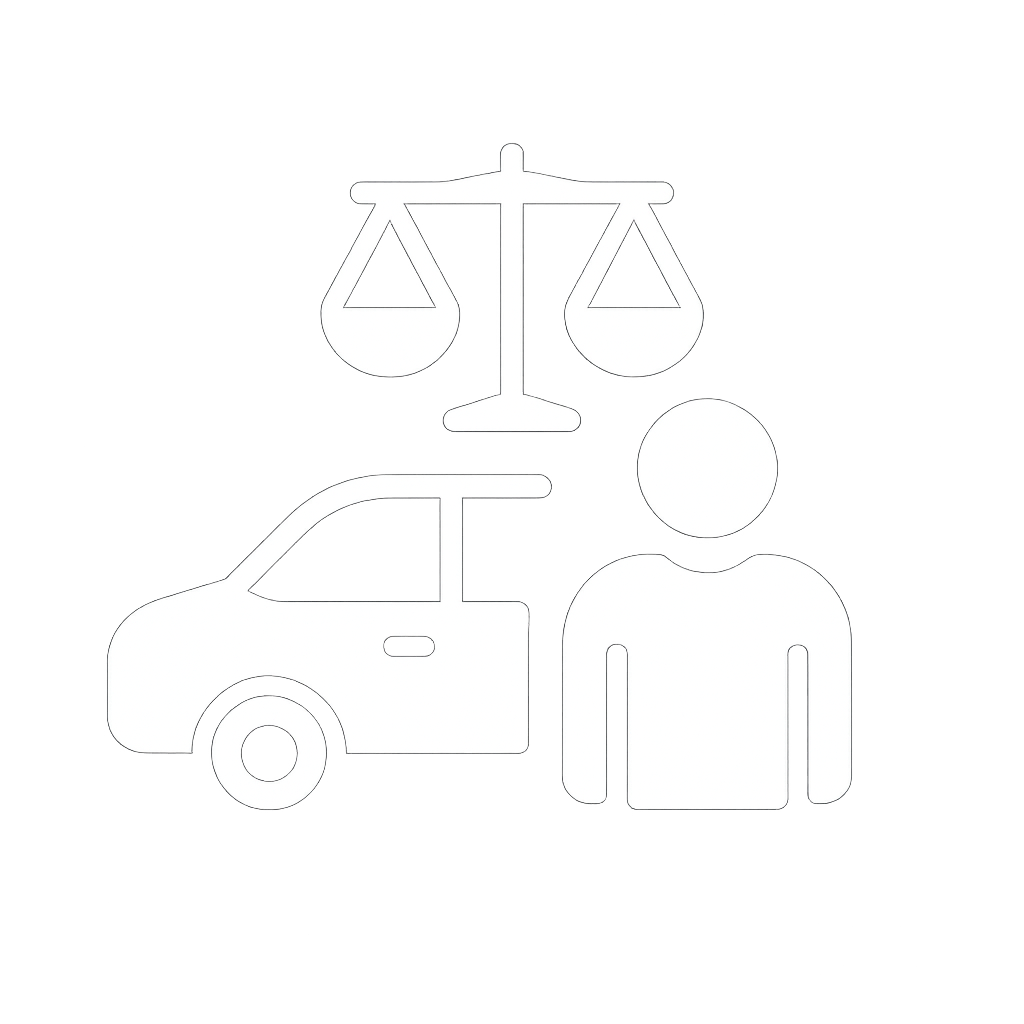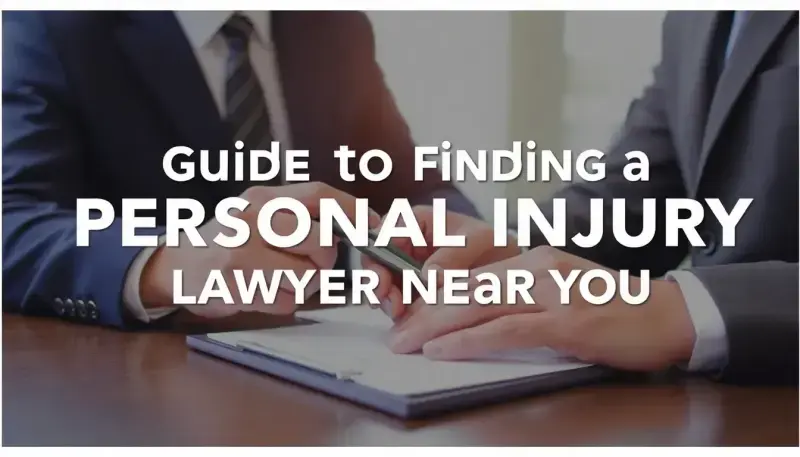When faced with the aftermath of an accident, navigating the complexities of personal injury law can feel daunting. You may find yourself frantically searching for a “personal injury lawyer near me,” overwhelmed by an avalanche of information and choices. The physical pain, emotional distress, and financial burden can cloud your judgment, making it crucial to find the right legal representation.
Choosing the right injury lawyer is not merely a matter of convenience; it is about safeguarding your future. An adept lawyer can fight for maximum compensation, ensure you receive appropriate medical care, and protect you from insurance companies that may seek to undermine your claim. A poor choice could result in inadequate compensation or, even worse, a loss of your case entirely. This comprehensive guide aims to shed light on why hiring a local personal injury attorney is essential, how to identify the right one, and what to expect during the process.
Why finding a local personal injury lawyer near me matters
Hiring a local personal injury lawyer offers more than just geographical convenience. It plays a pivotal role in crafting a strategic approach to your case.
Key Advantages of Choosing a Local Lawyer:
- Familiarity with Local Courts and Judges: Local attorneys are well-acquainted with how specific judges operate, their tendencies in courtroom procedures, and what types of evidence they find compelling. This insight allows for more effective case planning.
- Established Relationships: Good local lawyers cultivate relationships with key figures such as doctors, police officers, court clerks, and fellow attorneys. These connections can facilitate faster processes and enhance negotiation outcomes.
- Accessibility: Proximity means you can meet your lawyer in person when urgent matters arise, ensuring timely communication and action.
- Community Reputation: A lawyer invested in their community is more likely to fight diligently for their clients to maintain a positive reputation and receive referrals.
In essence, choosing a local lawyer can significantly influence the outcome of your case, potentially making the difference between a substantial win and a meager settlement.
What a personal injury lawyer actually does
Understanding the multifaceted role of a personal injury lawyer can help you appreciate the value they bring to your case. Their responsibilities extend far beyond the courtroom.
- Thorough Investigation: Lawyers will gather evidence by reviewing surveillance footage, reconstructing accident scenes, interviewing witnesses, and obtaining vital documentation.
- Preservation of Evidence: Time-sensitive evidence needs to be secured quickly, including skid marks, defective products, or any relevant surveillance videos.
- Comprehensive Damage Assessment: They evaluate future medical expenses, lost wages, and long-term suffering to ensure that you do not agree to an inadequate settlement.
- Insurance Negotiation: Insurance companies often employ tactics to minimize payouts. An experienced lawyer can counteract these strategies effectively.
- Litigation Preparation: Even if your case settles out of court, preparing for litigation can pressure insurers into offering fairer settlements.
Without a seasoned advocate, victims may find themselves at a severe disadvantage when negotiating settlements or pursuing claims.
What to do immediately after an accident
If you are contemplating hiring a personal injury lawyer, taking specific actions right after an accident can significantly bolster your case.
Essential Steps to Follow:
- Seek Medical Attention: Prompt medical evaluation is crucial for your health and your legal case.
- Document the Scene: Take photographs of your injuries, vehicles involved, scene conditions, and any contributing factors.
- Gather Witness Information: Collect names, phone numbers, and addresses of any witnesses present.
- File an Official Report: Notify the authorities or the property owner if injuries occurred on their premises.
- Limit Communication: Avoid making detailed statements to insurance adjusters until you consult your lawyer.
- Preserve Evidence: Keep damaged clothing, vehicles, or any defective items involved in the incident.
The stronger your documentation from the onset, the more compelling your claim will become.
How to choose the right injury lawyer near me
Choosing an attorney is one of the most significant decisions you will make following an injury. Here’s a structured approach to help you make an informed choice:
- Look for Specialized Experience: Just as you wouldn't consult a general practitioner for brain surgery, seek out a lawyer who specializes exclusively in personal injury law.
- Evaluate Their Track Record: Reputable lawyers will share details of past settlements and verdicts. Look for success in cases similar to yours.
- Read Client Reviews: Platforms like Google and Avvo provide insights into clients' experiences. Pay attention to recurring themes, especially concerning communication and settlement outcomes.
- Consult Multiple Lawyers: Free consultations enable you to compare multiple attorneys. Trust your instincts about their professionalism and dedication.
- Ask Informed Questions: Inquire about who will handle your case, updates on your case, trial experience, and their success rates.
Quality lawyers are always receptive to inquiries and welcome challenging questions.
Red flags to watch for in a personal injury lawyer
Not every lawyer is trustworthy or competent. Be vigilant for the following warning signs:
- Guarantees a specific settlement amount.
- Fails to provide a clear explanation of fees.
- Pressures you to sign documents quickly.
- Promises a fast settlement without reviewing evidence.
- Displays overwhelmingly negative online reviews.
Choosing the wrong lawyer can lead to financial loss, wasted time, and additional stress.
What to expect after hiring a personal injury lawyer near me
Once you hire a personal injury lawyer, your case will progress through clearly defined stages:
Step 1: Full Case Review and Strategy Development
Your attorney will gather police reports, witness statements, medical records, and any other relevant documentation.
Step 2: Negotiation with Insurance Companies
Your lawyer will submit a demand package that outlines the value of your case, initiating settlement negotiations.
Step 3: Filing a Lawsuit (if necessary)
If insurance negotiations do not yield a fair offer, your lawyer will initiate a lawsuit and engage in formal discovery, which includes sharing evidence and conducting depositions.
Step 4: Trial Preparation and Litigation
Your lawyer will prepare for a jury trial, utilizing evidence and expert testimonies to build a compelling case.
Common types of cases personal injury lawyers handle
Personal injury lawyers are equipped to handle a wide variety of cases, including:
- Car Accidents: Incidents involving distracted drivers, drunk driving, or uninsured motorists.
- Truck Accidents: Crashes involving large commercial vehicles, often with serious injuries.
- Motorcycle Accidents: These accidents can lead to catastrophic injuries due to a lack of protection.
- Slip-and-Fall Injuries: Incidents that occur in public or private spaces due to negligence.
- Dog Bites: These cases can be particularly severe, especially for children.
- Workplace Accidents: Injuries that happen in various work environments, including construction sites.
- Defective Product Injuries: Cases involving injuries caused by faulty or dangerous products.
- Wrongful Death: Claims related to fatalities resulting from another party's negligence.
Each type of case requires a tailored legal strategy and expertise.
How personal injury lawyers maximize settlements
Skilled personal injury lawyers employ a series of strategies to maximize your settlement:
- Presenting Robust Medical Evidence: Demonstrating the future care needs and their costs.
- Engaging Experts: Collaborating with doctors, economists, and life planners to strengthen your case.
- Exposing Insurance Bad Faith: Pursuing punitive damages when insurers act unfairly.
- Preparing for Trial: Comprehensive preparation enhances bargaining power, even if a settlement seems likely.
Thorough preparation translates into higher settlement offers.
Common tactics insurance companies use against you
Insurance companies often employ various tactics to minimize payouts. Be aware of these strategies:
- Blaming the Victim: Suggesting that you were responsible for the accident.
- Minimizing Your Injuries: Arguing that your injuries are not significant.
- Delaying Payments: Prolonging the claims process in hopes that you will accept a lower offer out of desperation.
- Surveillance: Monitoring your social media and employing private investigators to discredit your claims.
An experienced personal injury lawyer knows how to counter these tactics effectively.
How much compensation can you expect?
The compensation you might receive depends on various factors, including:
- Severity of injuries sustained.
- Total medical expenses incurred.
- Projected future care needs.
- Loss of income and diminished earning capacity.
- Emotional distress and pain and suffering.
Typical Settlement Ranges: Your lawyer will work diligently to maximize compensation across all categories.
How long do you have to file?
Each state imposes strict deadlines for personal injury claims, known as “statutes of limitations.” For example:
- Texas: Generally, you have 2 years to file for most personal injuries.
- Claims Against Government Entities: Often, you have only 6 months to file.
- Medical Malpractice: This can be complex and varies depending on the specifics of the case.
Act swiftly; delays can jeopardize even the strongest cases.
Extended FAQ section
Q: Should I go to the hospital even if I feel okay after an accident?
Yes, it’s vital to get checked out; injuries may not be immediately apparent.
Q: Can I still sue if I was partly at fault?
Yes, most states allow for “comparative negligence,” meaning your compensation may be adjusted based on your level of fault.
Q: What if the other driver has no insurance?
You may still recover damages through uninsured motorist coverage or other available sources.
Q: How long does the average case take?
Most personal injury cases settle within 6 to 12 months, while those that go to trial can take 2 years or longer.
Q: Do personal injury cases usually go to court?
In fact, over 90% of cases settle before reaching trial.
Q: What happens if I switch lawyers midway?
You can change attorneys at any point, but be mindful of any outstanding fees.
Q: How are attorney fees calculated?
Fees typically range from 33% to 40% of the total settlement.
Q: Will my settlement be taxed?
Generally, personal injury settlements for physical injuries are not subject to taxation.
Don’t just Google “personal injury lawyer near me” — choose wisely
While searching for a “personal injury lawyer near me” is a sensible starting point, discerning clients dig deeper. Look for a lawyer with:
- Real trial experience.
- Clear communication and a listening ear.
- Proven track records of substantial results.
- A commitment to advocate fiercely, not just settle quickly.
A competent personal injury lawyer will safeguard your rights, maximize your compensation, and provide peace of mind during one of life's most challenging times. Begin your search today to take the first step toward recovery and justice.
For a more in-depth perspective on choosing a personal injury lawyer, consider watching this informative video:
Para ayudarte en este proceso, aquí tienes un video que te guiará en la búsqueda de un abogado de lesiones personales cerca de ti.


